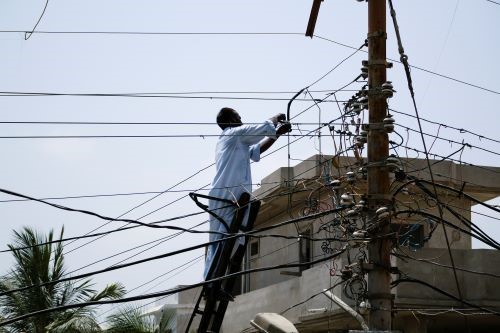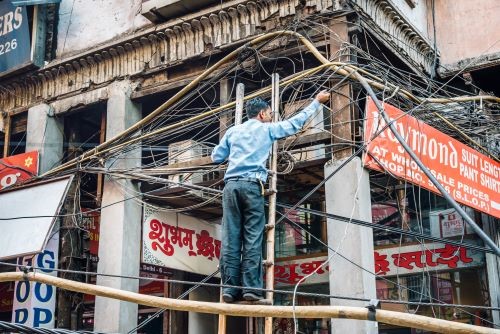India’s electrical maintenance workers, or ‘linemen’, play a vital role in keeping the power running to homes and businesses, but unions warn they lack essential safety training and equipment, with often deadly consequences.
Features
Linemen fatalities: a shocking situation
On 2 February, a 35-year-old electrical repair ‘lineman’ named Lalit Kumar was burnt to death in the Bijnor district of Uttar Pradesh after coming in contact with a high-tension live electrical wire. His co-worker, another electricity supply maintenance lineman named Udayraj Singh, was critically injured in the incident, which occurred when the two men were attempting to trace and fix a defect in overhead electricity supply cables connecting the towns of Sahaspur and Tajpur line following an electricity shutdown.
The two workers were electrocuted after the electricity supply to the cables was accidentally switched on from a nearby power station while they were attempting to fix the fault.
Meanwhile, on 12 February, another unnamed lineman employed by Kashmir’s Power Development Department (PDD) died after he received an electric shock while repairing an electric wire at Batpora village in Kunzar, in north Kashmir’s Baramulla district. His family members allege the incident occurred due to the negligence of the PDD as the electricity supply was mistakenly restored to the area while the lineman was still repairing the wire.

Photograph: iStock, credit danishkhan
Annual Lineman Diwas (Lineman’s Day)
Both these cases were reported barely a month before the Central Electricity Authority (CEA) – in association with Tata Power Delhi Distribution (Tata Power–DDL) Ltd – commemorated the fourth annual Lineman Diwas (Lineman’s Day) on 4 March in New Delhi. The day seeks to pay tribute to the efforts of India’s power sector workers in constructing and maintaining the country’s crucial network of electricity supply cables, sub-stations and transformers that supply power to cities, towns, villages, businesses and homes.
Over 150 linemen and linewomen from over 40 state and private electricity transmission and distribution companies participated in the celebrations in New Delhi. The theme was ‘Seva, Suraksha, Swabhiman’, signifying the dedication, service and sacrifice of the frontline heroes of the electrical power sector.
During the event, workers exchanged ideas and best practices for safe working, with the aim of fostering collective learning across the power industry. The event also featured a display of equipment designed to keep workers safe and short films from various electricity transmission and distribution companies were shown, highlighting the importance of safe working procedures and incident prevention. The overall aim was to encourage linemen and linewomen to gain insight from their peers, broaden their perspectives and reinforce effective safety protocols, therefore promoting a safer working environment for all.
In a special video message, Raj Kumar Singh, Union Minister for New and Renewable Energy, said the government hoped the celebration would mark the beginning of a culture of greater appreciation for the unrelenting efforts of the frontline workers of the power sector. “We take immense pride in recognising their invaluable contribution, they work even in the face of challenges like adverse weather and unforeseen crises,” he said.
The minister also complimented the line workers for going the extra mile to minimise interruptions to the nation’s electrical power supply, lauding them as a lifeline of the nation. “We are grateful to the linemen who go above and beyond to ensure uninterrupted power supply for the functioning of the country’s technological, industrial, and social infrastructure,” said Raj Kumar Singh.
Meanwhile, also speaking on Lineman’s Day, Ghanshyam Prasad, chair of the Central Electricity Authority, the government-run body that sets standards for the correct and safe construction, operation and maintenance of the country’s electricity generating plants and supply infrastructure, said linemen are the strongest pillar of the nation’s power system.
“The observance of ‘Lineman Diwas’ emphasises our profound appreciation for their dedication and relentless service,” said Prasad. “The purpose behind recognising the hard work of these frontline workers is to educate them on safety and inspire them to persist in their exemplary efforts.”
Posting on Instagram, Tata Power–DDL said the day is dedicated to ensuring the safety of its linemen who work in the most challenging situations to maintain the country’s electricity supply.
Prasad also pointed out that line workers face various challenges during their day-to-day work, ranging from adverse weather conditions to technical complexities.
He added that by working together to implement best practices and embracing a culture of good health and safety, electricity supply and infrastructure businesses can ensure linemen remain safe and empowered to carry out their essential duties effectively.
Risk of death and injury
However, commentators say linemen are regularly put at risk of death and serious injury while maintaining overhead cables, electricity substations and transformers, with fatal and serious injuries reported with alarming frequency in the nation’s media.
Trade unions representing line workers argue that many of the employees lack basic safety equipment designed to reduce the risk of electrocution and thermal burns from contact with live electrical parts, and prevent falls from height while repairing overhead cables and transformers, such as rubber gloves, safety belts and other protective gear.
There have also been numerous incidents where the electricity supply to overhead cables, transformers and sub-stations has been re-connected while a lineman has been attempting a repair, often with deadly consequences.
Commentators say the electricity supply companies have inadequate procedures to ensure the electricity supply remains isolated while linemen are working on equipment, such as poor control of paper permits designed to ensure the supply is not switched on until the lineman confirms the work has been completed and it is safe to do so.
Campaigners also claim that although the electricity supply companies have developed standard operating procedures (SOPs) for safe working on electrical equipment like powerlines, they are often not followed correctly by linemen and engineers, and companies fail to adequately supervise the workers to ensure they are adhering to the necessary measures.
In addition, trade unions warn that poor training of linemen and electrical engineers – who are often accused of accidentally switching on the power while colleagues are still working on the live supply – is another causal factor in fatal and serious incidents involving accidental re-connection of the electricity supply.
The working hours of linemen also potentially contribute to the risk of accidents due to the possibility of fatigue leading to dangerous errors, with some linemen working for up to 12 hours a day, particularly those who are contracted labourers, rather than direct employees of the electricity supply companies.

Photograph: iStock, credit Nikada
Lack of electrically insulated gloves
Commenting on the dangerous working conditions, Gurpreet Mehdoodan, division president of the trade union Punjab State Electricity Board Employees Federation, told a media outlet that although the power to the lines and cables is turned off when a specific section needs to be serviced, due to the use of generators and inverters, the electrical current sometimes flows back into the wires from the user’s end.
He added that to ensure linemen are protected from electric shock, they must wear special electrically insulated and burn-resistant gloves, “but we don’t get those”.
Another crucial piece of safety equipment is a safety belt, which can be attached to electricity poles and transformer structures to prevent linemen falling from height in the event of an electric shock. “However, as linemen don’t have the belts needed to tie themselves to the pole they keep falling off from heights,” said a 28-year-old Bangalore Electricity Supply Company (BESCOM) worker, who did not wish to be named.
Linemen also require high-power torches so they can clearly see what they are doing while working during dark evenings and nights, but they are often not provided with them and have to rely on the flashlight from their mobile phones. However, mobile phone torches are not bright enough to provide the level of illumination required for the tasks, added the unnamed worker.
Poor training and supervision
Workers also claim that poor training and supervision of junior electrical engineers is another contributory factor in electrocution incidents, as junior engineers often de-energise the wrong electrical line, or accidentally re-connect the supply to a power line or transformer while a lineman is working on the equipment.
Although there are numerous media reports of junior engineers and assistant linemen being sacked by electricity supply companies, and investigated and prosecuted by the police for causing death through negligence following incidents where a linemen has been fatally electrocuted because the power was wrongly restored during repair work, some linemen allege the only punishment for some engineers and junior linemen making these grave mistakes is suspension from work by the electricity companies.
Trade unions say that although electricity supply companies often pay compensation and grant pension payments to the families of linemen fatally and seriously injured at work, and offer their children jobs, the focus should instead be on providing better safety training and equipment for linemen, engineers and supervisors to prevent accidents happening in the first place.
Commenting after the fatal electrocution of a line helper in Soilom, Goa, in November 2023, Jit Arolkar, member of the Goa State Assembly for Mandrem, representing the Maharashtrawadi Gomantak Party, told The Times of India that line helpers are most commonly the victims of electrocution.
“When staff are deployed on duty, a senior must ensure that the junior is carrying out the work safely,” he added.
Failure to follow standard operating procedures
In an editorial comment posted following the electrocution death of a 32-year-old lineman in Srinagar, Jammu and Kashmir, in June 2023, the Greater Kashmir newspaper stated: “There should be an end to such mishaps and that is possible only when all the standard operating procedures (SOPs) are followed.
“Reports say that the SOPs are not strictly adhered to. The SOPs have to be followed in letter and spirit if the lives of the ground staff of PDD [The Jammu and Kashmir Power Development Department] have to be protected.
“The ground staff and their immediate senior officers should not work casually. They must ensure their own safety and the safety of their other colleagues.
“The department must also provide all the necessary safety gears to the employees and other workers, while doing repairs or other such works.”
The Greater Kashmir newspaper editorial comment added: “Reports say that sometimes due to lack of coordination among the employees, power supply is suddenly restored when the PDD men are at work and this puts their lives to risk.”
“Doing the repair work must not be a one-man job but other employees too need to get involved so that there is proper coordination and a support system. Proper precautions and care are very much needed. Any carelessness is bound to have disastrous consequences.
“[Jammu and Kashmir Power Development Department] PDD must hold regular interactions with the ground staff and educate them further regarding sticking to SOPs and using safety gears while on work. There is also a need to compensate properly the affected families.”


FEATURES

India’s path to net zero: a work in progress
By Orchie Bandyopadhyay on 08 April 2025
India is implementing a variety of clean energy measures to hit its target of net zero greenhouse gas emissions by 2070, including plans to rapidly scale up the generation of nuclear power. However, climate experts say significant finance will be required from developed countries to phase out coal power, accelerate renewables deployment and expand the national electricity grid.

Too hot to handle: early arrival of heatwaves in India sparks calls for action to protect workers and the public
By Orchie Bandyopadhyay on 08 April 2025
Temperatures in India in February 2025 were the hottest since records began over a century ago, prompting warnings the country needs to urgently step up efforts to protect both workers and the general population from the health risks posed by extreme heat and humidity.

